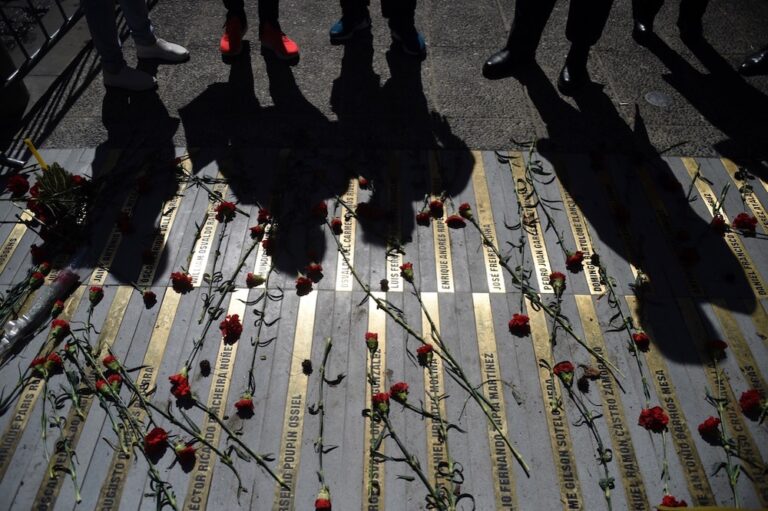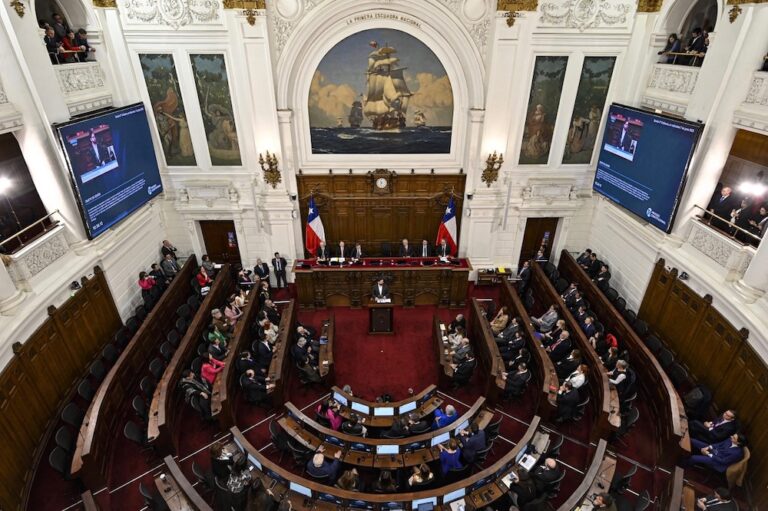(PERIODISTAS/IFEX) – On 26 July 2004, Paulina de Allendes-Salazar and Marcelo Simonetti, of Televisión Nacional station, and Emilio Sutherland, a journalist for Channel 13 station, appeared before a Santiago criminal court in connection with their coverage of the so-called “Caso Spiniak”, a paedophile case that implicates high-level political figures. In October 2003, businessman Claudio Spiniak […]
(PERIODISTAS/IFEX) – On 26 July 2004, Paulina de Allendes-Salazar and Marcelo Simonetti, of Televisión Nacional station, and Emilio Sutherland, a journalist for Channel 13 station, appeared before a Santiago criminal court in connection with their coverage of the so-called “Caso Spiniak”, a paedophile case that implicates high-level political figures.
In October 2003, businessman Claudio Spiniak was detained on charges of abusing minors. At the time, reports were circulated alleging that several senators participated in orgies with minors. The Independent Democratic Union (Unión Democrática Independiente, UDI) party, to which one of the senators belonged, filed a complaint, saying that the accusations were politically motivated and had been instigated by their rivals, with the complicity of journalists and children’s rights organisations.
In July 2004, Judge Eleonora Domínguez, who is investigating whether the individuals questioned in the case gave false testimonies, prosecuted the primary witness and a priest. The judge came to the conclusion that they had lied about the participation of high-level political figures in the events in question.
Allendes-Salazar and Simonetti, a journalist and editor, respectively, for the “Informe Especial” programme, were put on trial for having broadcast images that were filmed at private locations without authorisation. The judge was more severe with Allendes-Salazar since she believed that the camera used in filming the images was stolen. Allendes-Salazar emphatically denied this allegation. “The images came from an individual who expressly asked us not to reveal their identity. We protected our source, which the Press Law allows us to do,” the journalist said.
Sutherland was charged with having violated Article 161 of the Penal Code, which prohibits the recording and dissemination of images without the consent of the individuals involved. The journalist was accused of having filmed Spiniak’s arrest at his home. The National Television Council (Consejo Nacional de Televisión, CNTV) had previously fined Channel 13 for having filmed the arrest, but the Chilean Appeals Court reversed the ruling in April after concluding that the television station had filmed a public event and had not violated privacy rights. Prior to this, Article 161 had already been applied in the Spiniak case. In December, Chilevisión television station’s managers had faced charges for having broadcast images filmed with a hidden camera.
Chilean press organisations have condemned the actions against Allendes-Salazar, Simonetti and Sutherland. The Journalists’ Association (Colegio de Periodistas) said the judge’s decision constitutes “a clear violation of the law on freedom of opinion and information and the rights of journalists (Ley sobre Libertades de Opinión e Información y Ejercicio del Periodismo). This law guarantees the right to seek, receive and impart information for the common good.”
The University of Chile Communication Institute’s Freedom of Expression Programme reiterated that Article 161 should be eliminated, as the government has promised it would do for the last three years.


